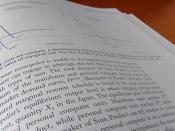CHAPTER 1.
THE NATURE OF ECONOMICS
I. Definition
Economics is a social science concerned with the efficient
utilization of scarce resources, in order to maximally satisfy society's unlimited wants.
II. Functions of Economics
The production, distribution, and consumption of goods and services.
III. Benefits of Economics
A. Most historical, social, and economic changes have economic backgrounds.
B. Governments are increasingly relying on economists for decision-making.
C. Economics teaches us that in the real world every decision we make involves opportunity costs or tradeoffs.
D. Economics helps the citizenry understand how the market, the government, and world politics function.
E. Economics helps the voters make wise public choices at elections.
F. Economics helps people in their personal and business decision-making.
IV. Types of Economics
A. Macroeconomics
A study of economic aggregates and policies on the national level, including income, output, the price level, and trade.
B. Microeconomics
A study of how consumers, households, firms, markets, and industries make their economic decisions.
V. Rationality Assumption
Rational people will not make decisions that will cause them to be worse off than before.
VI. The Invisible Hand Concept
The idea that while the participants of the market pursue their self interest, they automatically promote the public welfare. Thus, government must play only a limited role.
VII. The Methodology of Economics
A. Theories
General statements about cause and effect in economic life.
B. Models
Formal statements of theories showing the relationship between two or more variables.
C. Inductive Logic
Moving from facts to principles (Facts-Theories-Policies)
D. Deductive Logic
Moving from a hypothesis to its proof.
E. ceteris paribus - "all other things being equal" assumption
VIII. Approaches to Economics
A. Descriptive/ Positive Economics
Describes what exists and how it works.
B. Normative/ Applied Economics
Analyzes the outcomes of economic behavior, makes value judgments, and suggests...


